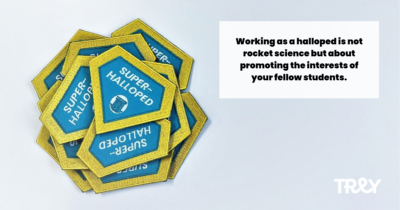This time the blog features Olli-Pekka Louniala, a halloped of the Faculty Council of the Faculty of ENS and and Pauliina Vainionpää, a halloped of the Faculty Council of SOC. Pauliina, 29, is starting her second year in Social Sciences and dreams about earning the Master of Social Sciences degree. O-P studied physics at Hiukkanen for the last academic year and switched now to Bioner but continues to study physics at the side. At the master’s level, he might be interested in writing a master’s thesis in physics or in medical physics.
But wait: what on Earth is the Faculty Council or a halloped? Let’s recap before countinuing on to the interview.
Student representatives in the administration, also known as hallopeds, are members of the community who represent the students in the institutions of university administration and who make sure that the rights of students are advocated for. Faculty Councils are an example of such institutions. The duties of an Faculty Council include monitoring and evaluating the implementation of the Faculty’s operational and financial plan, making a proposal to the Academic Board for the establishment and discontinuation of a degree programme, approving the curricula of the Faculty’s degree programmes for confirmation by the Academic Board, and deciding on the criteria for the assessment of theses and the evaluation of theses for postgraduate degrees.
Without further ado, let’s hear from the hallopeds themselves!
What made you want to become a halloped?
Pauliina: I was interested about the university’s administration and of course wanted to be able to have an influence on matters and learn new things. The Faculty Council meetings have been an amazing opportunity to learn how administration and meetings work in general. As a halloped I have also been able to get to know the staff better.
O-P: I have been involved in a lot of advocacy activities for a long time. I was involved in Jyväskylä Youth Council and municipal politics anyway, so being a halloped was a natural continuation for my previous endeavors. In this world there are two types of people – I think it was Antti Holma who said this once in his podcast – that there are politicians and then there are people who conform and say, yeah whatever. The politicians are those who say now I am going to change the things I can in my environment. I guess I am one of the politicians. I think it’s about wanting to change things.
Which experiences or skills have helped you while working as a halloped?
Pauliina: I think that one must be able to see the bigger picture and be able to link thinks together meaningfully. It is also important to be able to discern the connections between the Faculty Council, the university administration and the everyday life of a student. It’s also important to have the skill to really listen and take in information because when you work in the Faculty Council the amount of information thrown at you is quite huge and the topics themselves are varied. You must keep your eyes open to stay on course. I have learned these skills in my studies and in my work life as an entrepreneur.
O-P: All students should apply for the position of a halloped, even if you were a Fresher. Hallopeds are just normal everyday people after all, though of course experts in their respective fields. It’s important to have the skills to voice your own opinions though. You might find a particular course module annoying, and you might already be someone who people feel comfortable talking to about these issues. That might make you say, “yeah that really is annoying” and then you can become a halloped and change things for the better. You get the change to say, “hey this thing is really bothering us students.” So, if you have even the tiniest of feeling that you are that kind of a person who is willing to voice your opinions then that is a good skill to have as a halloped.

How much of your time does working as a halloped take?
Pauliina: We have one meeting once a month which takes about two hours. In addition, we have meeting materials that are sent to us before the meeting. It varies from person to person how much time it takes to study the materials, depending on how closely you want to study them. In my case we are talking about a few hours each month. There is also an evening session every year, which will be a couple of extra hours.
O-P: The meetings are held during office hours which is a little bit bothersome because the schedules might overlap with studies. Luckily, we do have debuty representatives. Usually, I spend about 1 to 1.5 hours reading the meeting materials and discussing them with a fellow halloped. If the materials have had something more substantial in them, we might have discussed the items on it even longer than that. But in the end being a halloped does not take that much of my time. Of course, sometimes you might spend some time discussing a particular topic with someone, like why master’s thesis courses are only held in Spring.
What have you learned while working as a halloped?
Pauliina: I have learned about meeting practices. I’ve also learned about how the university and the faculties handle and organize their finances. I’ve learned about the system as a whole, how, and what matters are processed in the Faculty Council.
I think it has been great to hear that the voice of the student community is appreciated in the Faculty Councils. Our voice is heard, and our opinions are wanted.
O-P: I have gained perspective on how faculties work as organizations, in which order things are handled and what kind of roles different people have in them. I have learned a lot about finances and grants since before I only had a tiny inkling on how the finances are handled in the university on the faculty level.
Of course, another form of continuous learning is the ways you interact with others in your own role the organisation, and how to make the voice of the students heard. It is also exciting and cool to be able to sit in the same tables with professors and possible future bosses for summer jobs and to have discussions with these people almost as if you were peers.
Are there any tips you could share with students who are interested to become a halloped themselves?
Pauliina: Just do it, sign in! It’s totally okay if you don’t understand or know a lot of things at first, all are welcome. We were shown how the whole thing works before the first meeting and in the end, you learn how to be a halloped by attending meetings anyway. I have been a halloped in a Faculty Council since January and only in August did I feel like I got the handle on things, and sometimes I still feel a little lost. And that is completely fine since as a student our job is literally to learn and to bring the voice of student at the forefront and that is what I like the most about being a halloped. So just try it out, is what I would say.
You shouldn’t put too much pressure on yourself at first either, because you’ll start to find your own voice as time goes on. And before you even notice you have the courage to raise your hand and take a stand for the things that matter to you.
O-P: Be brave! When you have an opinion, learn how to voice that opinion even if no one was backing you up. The sooner you learn that if you have something to say you should just get out with it, the better. Everybody should express how they see things.
Just like in anything else you have to learn to let go of the very Finnish attitude of “no use in doing anything about it.” If you feel like your friend has a good point on something you can be the one to voice that opinion forward. You could almost call it a bystander effect, like in a situation where someone hurts themselves on the street, no one will help until someone dares to be the first one to do something. For example, in a guild people might be talking about how certain courses are in a funny order or the whole course module is all messed up, but nobody is willing to tell a teacher or the person in charge of the course about it. So be the one to take the matter into your own hands!
Is there anything else you would like to say?

Pauliina: As a halloped, you learn to think about things from different perspectives, when they are discussed at length. You also start to see the university as a broader entity when you work as a halloped than what it might look like from the students’ everyday point of view. As a student you usually focus on the course credits, lectures, and courses, and you are only able to see the matters from your own perspective. This is exactly why I find it so amazing that I get to learn to take a look behind the scenes.
One time, I was talking with my fellow students before attending the meeting and they had no idea what a Faculty Council was. Not many of the students know about the work we do, so it’s awesome if students are interested about being a halloped and have the opportunity to become one. Maybe it is also our job as hallopeds to find ways to make the information about our work more visible and accessible. I hope that this blog helps with that!
O-P: The application process might feel a little bit suspenseful when they ask about your experience and such. But don’t be afraid because in my opinion it is completely fine if you don’t have a lot of experience, as long as you want to work hard and use your brain. I was also little bit apprehensive about applying but even as a Fresher I got in.
Working as a halloped is not rocket science but about promoting the interests of your fellow students. All you need for that is to be a decent person, who makes sure the opinions of the students are heard in the decision-making. Don’t be afraid to try it out, being a halloped is really not that demanding at all. It’s also an excellent gateway to advocacy work and university politics in general. All you need as a halloped is the ability to listen and to participate actively. You can always ask for help from TREY as well if you need it.
Thank you to Pauliina and Olli-Pekka for the interview! Did the work as a halloped spark your interest? Stay tuned and follow TREY channels to learn more about the supplement application period! You can find more information about the work as a halloped from TREY’s website.